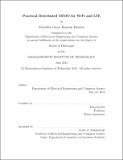| dc.contributor.advisor | Dina Katabi. | en_US |
| dc.contributor.author | Hamed, Ezzeldin Omar Hussein | en_US |
| dc.contributor.other | Massachusetts Institute of Technology. Department of Electrical Engineering and Computer Science. | en_US |
| dc.date.accessioned | 2018-09-17T14:51:38Z | |
| dc.date.available | 2018-09-17T14:51:38Z | |
| dc.date.copyright | 2018 | en_US |
| dc.date.issued | 2018 | en_US |
| dc.identifier.uri | http://hdl.handle.net/1721.1/117834 | |
| dc.description | Thesis: Ph. D., Massachusetts Institute of Technology, Department of Electrical Engineering and Computer Science, 2018. | en_US |
| dc.description | This electronic version was submitted by the student author. The certified thesis is available in the Institute Archives and Special Collections. | en_US |
| dc.description | Cataloged from student-submitted PDF version of thesis. | en_US |
| dc.description | Includes bibliographical references (pages 115-121). | en_US |
| dc.description.abstract | Distributed MIMO has long been known theoretically to bring large throughput gains to wireless networks. Recent years have seen significant interest and progress in developing practical distributed MIMO systems. Multiple systems have developed coordination protocols to synchronize multiple nodes and enable them to transmit simultaneously without interference. However, there are still several challenges that need to be addressed in order to have a practical distributed MIMO system for WiFi and LTE. In this thesis, we address the practical limitations in distributed MIMO systems. We present algorithms that enable practical distributed MIMO in the context of WiFi and LTE. Furthermore, we demonstrate these algorithms through Hardware/Software architectures which are implemented on an FPGA platform and run in real-time. We present two different systems in this thesis. For WiFi, we present MegaMIMO 2.0, the first real-time 802.11 distributed MIMO system. MegaMIMO 2.0 builds on top of state of the art work in distributed MIMO, and adds support for dynamic environments and mobile clients while meeting the tight timing requirements of the 802.11 WiFi standard. We also introduce Chorus the first scalable distributed MIMO system for LTE. Chorus works with the different modes of LTE and is resilient to changes in network configuration. Both MegaMIMO 2.0 and Chorus require no change to the user devices, and are fully compatible with the 802.11 standard for WiFi and the 3GPP standard for LTE. | en_US |
| dc.description.statementofresponsibility | by Ezzeldin Omar Hussein Hamed. | en_US |
| dc.format.extent | 121 pages | en_US |
| dc.language.iso | eng | en_US |
| dc.publisher | Massachusetts Institute of Technology | en_US |
| dc.rights | MIT theses are protected by copyright. They may be viewed, downloaded, or printed from this source but further reproduction or distribution in any format is prohibited without written permission. | en_US |
| dc.rights.uri | http://dspace.mit.edu/handle/1721.1/7582 | en_US |
| dc.subject | Electrical Engineering and Computer Science. | en_US |
| dc.title | Practical distributed MIMO for WiFi and LTE | en_US |
| dc.title.alternative | Practical distributed multiple-input and multiple-output for WiFi and LTE | en_US |
| dc.type | Thesis | en_US |
| dc.description.degree | Ph. D. | en_US |
| dc.contributor.department | Massachusetts Institute of Technology. Department of Electrical Engineering and Computer Science | |
| dc.identifier.oclc | 1052123718 | en_US |
